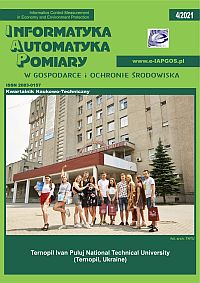EFFICIENT LINE DETECTION METHOD BASED ON 2D CONVOLUTION FILTER
Article Sidebar
Issue Vol. 11 No. 4 (2021)
-
SINGULAR INTEGRATION IN BOUNDARY ELEMENT METHOD FOR HELMHOLTZ EQUATION FORMULATED IN FREQUENCY DOMAIN
Tomasz Rymarczyk, Jan Sikora4-8
-
APPLICATION OF THE THREAT INTELLIGENCE PLATFORM TO INCREASE THE SECURITY OF GOVERNMENT INFORMATION RESOURCES
Bohdan Nikolaienko, Serhii Vasylenko9-13
-
INDIRECT INFORMATION HIDING TECHNOLOGY ON A MULTIADIC BASIS
Volodymyr Barannik, Natalia Barannik, Oleksandr Slobodyanyuk14-17
-
SELECTED APPLICATIONS OF DEEP NEURAL NETWORKS IN SKIN LESION DIAGNOSTIC
Magdalena Michalska18-21
-
EFFICIENT LINE DETECTION METHOD BASED ON 2D CONVOLUTION FILTER
Paweł Kowalski, Piotr Tojza22-27
-
FACTOR ANALYSIS METHOD APPLICATION FOR CONSTRUCTING OBJECTIVE FUNCTIONS OF OPTIMIZATION IN MULTIMODAL TRANSPORT PROBLEMS
Serhii Zabolotnii, Artem Honcharov, Sergii Mogilei28-31
-
QUALITY OF SATELLITE COMMUNICATION IN SELECTED MOBILE ANDROID SMARTPHONES
Przemysław Falkowski-Gilski32-37
-
CHROMATIC DISPERSION COMPENSATION IN EXISTING FIBER OPTIC TELECOMMUNICATION LINES WITH THE GROWING BIT RATES NEEDS OF DWDM SYSTEM
Tomasz Bobruk38-41
-
FIBRE OPTIC BRAGG STRUCTURES WITH MONOTONIC APODISATION CHARACTERISTICS
Jacek Klimek42-46
-
ON THE CAPACITY OF SOLAR CELLS UNDER PARTIAL SHADING CONDITIONS
Mateusz Bartczak47-50
-
CONTROLLING A FOUR-WIRE THREE-LEVEL AC/DC CONVERTER WITH INDEPENDENT POWER CONTROL IN EVERY PHASE
Bartłomiej Stefańczak51-54
-
METHOD OF MEASUREMENT AND REDUCTION OF THE ELECTROMAGNETIC DISTURBANCES INDUCTED BY SWITCHING SURGES IN LV CIRCUITS
Patryk Wąsik55-61
-
INCREASING THE COST-EFFECTIVENESS OF IN VITRO RESEARCH THROUGH THE USE OF TITANIUM IN THE DEVICE FOR MEASURING THE ELECTRICAL PARAMETERS OF CELLS
Dawid Zarzeczny62-66
-
ELLIPSOMETRY BASED SPECTROSCOPIC COMPLEX FOR RAPID ASSESSMENT OF THE Bi2Te3-xSex THIN FILMS COMPOSITION
Vladimir Kovalev, Saygid Uvaysov, Marcin Bogucki67-74
-
APPLICATION OF LOW-COST PARTICULATE MATTER SENSORS FOR MEASUREMENT OF POLLUTANTS GENERATED DURING 3D PRINTING
Jarosław Tatarczak75-77
Archives
-
Vol. 13 No. 4
2023-12-20 24
-
Vol. 13 No. 3
2023-09-30 25
-
Vol. 13 No. 2
2023-06-30 14
-
Vol. 13 No. 1
2023-03-31 12
-
Vol. 12 No. 4
2022-12-30 16
-
Vol. 12 No. 3
2022-09-30 15
-
Vol. 12 No. 2
2022-06-30 16
-
Vol. 12 No. 1
2022-03-31 9
-
Vol. 11 No. 4
2021-12-20 15
-
Vol. 11 No. 3
2021-09-30 10
-
Vol. 11 No. 2
2021-06-30 11
-
Vol. 11 No. 1
2021-03-31 14
-
Vol. 10 No. 4
2020-12-20 16
-
Vol. 10 No. 3
2020-09-30 22
-
Vol. 10 No. 2
2020-06-30 16
-
Vol. 10 No. 1
2020-03-30 19
-
Vol. 9 No. 4
2019-12-16 20
-
Vol. 9 No. 3
2019-09-26 20
-
Vol. 9 No. 2
2019-06-21 16
-
Vol. 9 No. 1
2019-03-03 13
Main Article Content
DOI
Authors
Abstract
The article proposes an efficient line detection method using a 2D convolution filter. The proposed method was compared with the Hough transform, the most popular method of straight lines detection. The developed method is suitable for local detection of straight lines with a slope from
-45˚ to 45˚. Also, it can be used for curve detection which shape is approximated with the short straight sections. The new method is characterized by a constant computational cost regardless of the number of set pixels. The convolution is performed using the logical conjunction and sum operations. Moreover, design of the developed filter and the method of filtration allows for parallelization. Due to constant computation cost, the new method is suitable for implementation in the hardware structure of real-time image processing systems.
Keywords:
References
Ballard D. H.: Generalizing the hough transform to detect arbitrary shapes. Pattern recognition 13(2), 1981, 111–122. DOI: https://doi.org/10.1016/0031-3203(81)90009-1
Elhossini A., Moussa M.: Memory efficient FPGA implementation of hough transform for line and circle detection. 25th IEEE Canadian Conference on Electrical and Computer Engineering (CCECE), 2012, 1–5 DOI: https://doi.org/10.1109/CCECE.2012.6335003
Guan J., An F., Zhang X., Chen L., Mattausch H. J.: Real-time straight-line detection for xga-size videos by hough transform with parallelized voting procedures. Sensors 17(2), 2017, 270. DOI: https://doi.org/10.3390/s17020270
Han Q., Zhao K., Xu J., Cheng M. M.: Deep hough transform for semantic line detection. 2020, arXiv preprint arXiv:2003.04676. DOI: https://doi.org/10.1007/978-3-030-58545-7_15
Illingworth J., Kittler J.: A survey of the hough trans form. Computer vision, graphics, and image processing 44(1), 1988, 87–116. DOI: https://doi.org/10.1016/S0734-189X(88)80033-1
Kowalski P., Smyk R.: Straight lines detection in digital image using hough transform. Zeszyty Naukowe Wydziału Elektrotechniki i Automatyki Politechniki Gdanskiej 61, 2018, 45–48.
Milletari F., Ahmadi S. A., Kroll C., Plate A., Rozanski V., Maiostre J., Levin J., Dietrich O., Ertl-Wagner B., Bötzel K., et al.: Hough-cnn: deep learning for segmentation of deep brain regions in mri and ultrasound. Computer Vision and Image Understanding 164, 2017, 92–102. DOI: https://doi.org/10.1016/j.cviu.2017.04.002
Mukhopadhyay P., Chaudhuri B. B.: A survey of hough transform. Pattern Recognition 48(3), 2015, 993–1010. DOI: https://doi.org/10.1016/j.patcog.2014.08.027
Ritchie D. M., Kernighan W., Lesk M. E.: The C programming language. Prentice Hall Englewood Cliffs, 1988.
Serra P. L., Masotti P. H., Rocha M. S., de Andrade D. A., Torres W. M., de Mesquita R. N.: Two-phase flow void fraction estimation based on bubble image segmentation using randomized hough transform with neural network (rhtn). Progress in Nuclear Energy 118, 2020, 103133. DOI: https://doi.org/10.1016/j.pnucene.2019.103133
Shehata Hassanein A., Mohammad S., Sameer M., Ehab Ragab M.: A survey on hough transform, theory, techniques and applications. 2015, arXiv:1502.02160.
Ye H., Shang G., Wang L., Zheng M.: A new method based on hough transform for quick line and circle detection. IEEE 8th International Conference on Biomedical Engineering and Informatics (BMEI), 2015, 52–56. DOI: https://doi.org/10.1109/BMEI.2015.7401472
Article Details
Abstract views: 424
License

This work is licensed under a Creative Commons Attribution-ShareAlike 4.0 International License.






